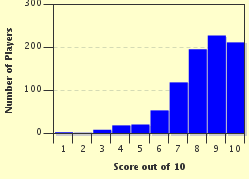Quiz Answer Key and Fun Facts
1. October 14th, 1066 -- Harold Godwinson becoming the King of England and violating a long-standing oath was the inevitable "Last Straw" for Duke William II of Normandy. Which important battle in Great Britain led to William becoming King of England?
2. December 29th, 1170 -- Murder in the Cathedral. What Archbishop of Canterbury excommunicated three of King Henry II's closest advisors, a "Last Straw" leading to the King inadvertently urging four knights to murder his former friend?
3. July 15th, 1215 -- Abuse of power, over taxation, and constant conflict with Pope Innocent III, was the "Last Straw" for many of the English barons. Which historic document did a group of Barons force King John to accept that led to a limitation of the powers of the monarchy?
4. September 14th, 1368 -- Zhu Yuanzhang was born into poverty but over a period of 10 years became a powerful warlord. Famine, plague, and the selfish Yuan dynasty leadership was the "Last Straw" that motivated him to capture Beijing and become the founder and first emperor of what powerful Chinese Dynasty?
5. August 3rd, 1492 -- He had been refused by King John II of Portugal twice, the rulers of Genoa and Venice multiple times, and finally the "Last Straw" was England's Henry VII who also refused his request for financial support. Which famous explorer finally found patronage with Isabella and Ferdinand of Spain and set sail for the New World?
6. October 31st, 1517 -- Martin Luther says "that's the Last Straw!" He nails 95 theses to the door of the Castle Church at Wittenberg. What was the primary cause of his outrage?
7. May 20th, 1604 -- First meeting of conspirators whose goal it was to assassinate King James I of England. On April 24th, 1604 a Bill was introduced to parliament that threatened to outlaw all English followers of the Catholic religion. This was the "Last Straw" for a group of nobles who became responsible for what infamous failed plot?
8. December 1st, 1765 -- Which Act passed by the British Parliament in 1765 was the "Last Straw" for the American colonists, who eleven years later declared independence from Great Britain?
9. April 12th, 1861 -- Abraham Lincoln, newly elected President of the United States of America, had just sent supplies to aid an outpost off the South Carolina coast. This was the "Last Straw" for Confederate state leaders and they chose to fire upon which Fort, effectively beginning the American Civil War?
10. December 7th, 1941 -- What Japanese attack (called Operation Z in its planning stages) was the "Last Straw" for the American people and caused the U.S.A. to dramatically enter World War II?
Source: Author
coachpauly
This quiz was reviewed by FunTrivia editor
bloomsby before going online.
Any errors found in FunTrivia content are routinely corrected through our feedback system.

